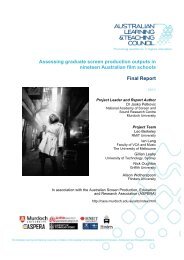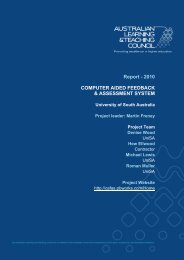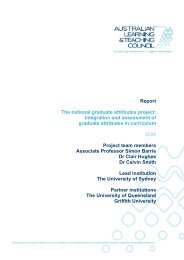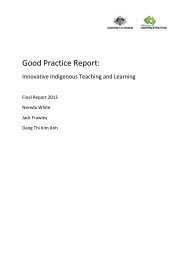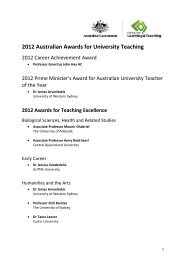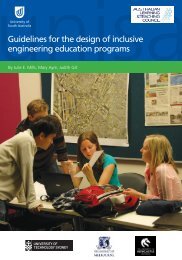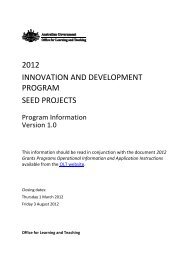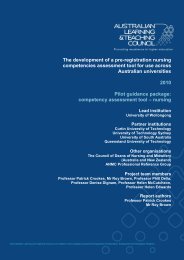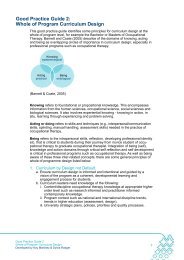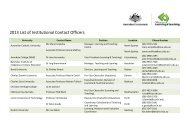national standards for psychological literacy and global citizenship
national standards for psychological literacy and global citizenship
national standards for psychological literacy and global citizenship
Create successful ePaper yourself
Turn your PDF publications into a flip-book with our unique Google optimized e-Paper software.
Length (Volume of Learning)<br />
3.1.1 The length of the course should be three years of full-time study, or the equivalent<br />
(consistent with the AQF Level 7 Volume of Learning Statement).<br />
Program Structure<br />
3.1.2 Across the three years, half (50%) of the units should be psychology [aspirational:<br />
200% plus].<br />
3.1.3 Normally, there would be a minimum of 25% in the first year, <strong>and</strong> 50% in each of<br />
the second <strong>and</strong> third years, with a minimum additional 25% gained in one of those<br />
years. In AOUs where structural limitations preclude 50% in the second year, then<br />
students must be able to average a minimum of 50% psychology across their<br />
second <strong>and</strong> third years (e.g., 33% in second year, followed by 67% in third year). In<br />
these cases, the acceptable minimum at second year is 33%.<br />
3.1.4 The third year of the course must include a minimum of 50% psychology <strong>and</strong> there<br />
should be the option <strong>for</strong> students to enrol in more psychology units.<br />
3.1.5 The course must be structured to ensure that the psychology graduate attributes<br />
(see St<strong>and</strong>ard 3.1.7) are covered by all students, while also offering the opportunity<br />
through elective components <strong>for</strong> students to study some areas in greater depth. It<br />
is recognised that the elective components in any AOU are likely to reflect the<br />
particular areas of strength <strong>and</strong> expertise of the AOU.<br />
Program Content<br />
3.1.6 The emphasis of the basic 3-year sequence must be on providing an education in<br />
the core discipline <strong>and</strong> research methods of psychology <strong>and</strong> not in one or more<br />
highly specialist professional areas (e.g., clinical or organisational psychology).<br />
3.1.7 The development of graduate attributes across the program should be explicitly<br />
sequenced; that is, upper-level UG units should explicitly build upon first-year unit<br />
content where possible.<br />
3.1.8 The accredited three-year sequence must provide students with a solid<br />
foundation in <strong>psychological</strong> <strong>literacy</strong>, that is, the psychology graduate attributes <strong>and</strong><br />
associated learning outcomes (based on the Graduate Attributes of the Four-Year<br />
Undergraduate Psychology Program [2012 Revision], available from the APAC<br />
website). This set of Graduate Attributes is consistent with the AQF Level 7<br />
Knowledge, Skills <strong>and</strong> Application Statements. It should be noted that the Program<br />
content is not limited to these Graduate Attributes.<br />
Graduate Attribute 1: Discipline knowledge <strong>and</strong> its application<br />
Demonstrate a broad <strong>and</strong> coherent body of knowledge of psychology, with depth in<br />
the underlying principles <strong>and</strong> concepts, <strong>and</strong> the capacity to apply this knowledge as<br />
the basis <strong>for</strong> life-long learning.<br />
1.1 Demonstrate an underst<strong>and</strong>ing of the history <strong>and</strong> philosophy of science <strong>and</strong><br />
psychology<br />
NATIONAL STANDARDS FOR PSYCHOLOGICAL LITERACY AND GLOBAL CITIZENSHIP 45



